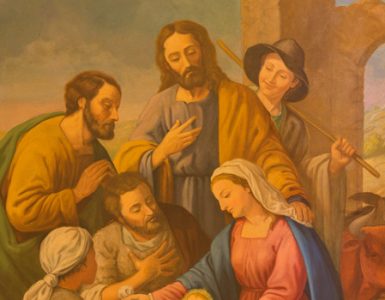Why did the Son of God become a human being? His Incarnation was not arbitrary, but essential to God’s plan to restore us to His friendship. We can see the perfection of that friendship in Adam.
Adam and Eve were called upon to look at the world as God does, and they were able to do so because they had sanctifying grace, and they were able to persevere in doing so because they had actual grace.
They could choose their actions; they knew who they were and knew the difference between themselves and the rest of creation, and thus could be partners with God in realizing their own destiny.
In other words, they demonstrated their union with God by their obedience to His Word.
Sin Enters the World
Enter the tempter.
Satan’s strategy is to try to divide Adam and Eve from their very selves and from their destiny. He doesn’t deny the existence of God but suggests that it’s God’s laws that alienate man from himself. This is a great lie — perhaps the great lie.
Freedom and truth are inextricably linked. By questioning the gift of harmonious integrity and protection he enjoyed from God, Adam made a movement of his will against obedience and against the all-giving spirit of God.
Thus sin entered the world. The sin was committed in both the intellect and the will, and so the fault is in both — and the punishments for the sin correspond to the fault.

The first punishment to enter the human race on account of the original sin was the darkening of the intellect. We became unable to appreciate why we were truly here — why we existed at all, what our purpose was. Second, our wills were weakened and infected with malice. Our nature wasn’t and isn’t totally depraved, but we do have a tendency to want to dance to our own tune and to make the rules ourselves. Third, we lost control of our emotions, which are properly subservient to reason. The feeling of love, for instance, goes this way and that way, and there’s no unity or harmony or integrity in our love.
And finally, in the body we lost the perfect integrity between our desires and our body’s responses to the world. Matter tends to corrupt, and the body tends to corruption, and to death.
Adam and Eve weren’t at peace anymore — in themselves, with God, or with one another. The sin spread its punishment throughout the whole human race.
Out of Love
This is the most beautiful truth of the Christian religion, and the reality that sets it apart: God allowed us to sin so that He might show more goodness and love to us, so that He might raise a being to Himself who was disintegrated, so that He might prove Himself a divine physician, and so that He might, in doing so, give us the greatest miracle that could ever exist: that God in person could become one of the human race.
Now, some say that Christ would have become incarnate whether we needed a redeemer or not, simply out of love. It’s certainly true that Christ could have taken flesh regardless of the sin; it certainly wouldn’t have been outside His power. But it would have been outside His justice. There would have been no reason why God should submit to such humiliation — the humiliation of our limits, of our mortality. St. Paul said that Christ Jesus,
though he was in the form of God, did not count equality with God a thing to be grasped, but emptied himself, taking the form of a servant, being born in the likeness of men. And being found in human form he humbled himself and became obedient unto death, even death on a cross. (Phil. 2:6–8)
There’s no reason that God would have done this except out of love to free us from our sins. That’s what the whole Christian tradition teaches us. Christ came to atone for both our fault and our punishment, and He had to address each.
Twofold Character of Atonement
The atonement then has a twofold character that is central to the doctrine of Christ. First, atonement demands that justice be restored in the face of a sin — disobedience to the Creator — that was committed in both the intellect and the will. The evil of punishment, including the loss of grace and the special gifts given to the human race by God, resulted from it.
Jesus took flesh to atone for the sin of disobedience, so it would be unfitting for Him to assume any punishment that would compromise His perfect obedience in love. He could only assume suffering and death. To satisfy for sin, Christ takes on human flesh so that in His human will and His human mind and in His human emotions and body He may make satisfaction for our disobedience by His obedience.
The second aspect of the atoning work of the Incarnation is as a cure for our sin and its punishment. Sin extinguishes the presence of the Holy Spirit in the soul, which is necessary for man to arrive at his destiny: the vision of God in heaven. Christ restores us by sending the Holy Spirit, to dwell within our hearts again. This is the essential cure for the sinfulness of mankind as a whole, and of each of us individually.
By a sin of disobedience we became divided from ourselves; God became incarnate so that by obedience He Who was without fault might satisfy for our fault, and for the punishments for our sin. Of all the punishments that Christ could have assumed for us, there was only one — our mortality — that would not have threatened His ability to be obedient to the Father. He was lovingly obeying on the Cross to atone for the unloving disobedience of Adam and Eve. His obedience atones for their fault.
The Incarnation Makes Sense
And so the Incarnation makes sense. God could have, with His absolute power, redeemed us simply by saying so, but that would have been a denial of His justice. Through the obedience of Christ He could atone for the original sin and reintroduce us into the divine life that we lost through the disobedience of Adam.
The Incarnation also has reasonability as an incentive to the life of faith and virtue. God chose to resolve man’s sin as He did as an encouragement to faith, hope, charity, and courage — to show that Satan has no real power over us if we rely on God. When we see our God made visible, we have a greater assurance of what we believe about Him, because it comes directly from Him!
The Incarnation also teaches and leads us to hope in God because, when we see all that God suffered for us, it should sustain us in perseverance. When we are tempted to give up hope, we can meditate on Christ’s agony in the Garden. If we’re without friends, we can remember that Jesus was deserted by His friends. If we’re suffering in our body, we can recall how painful the wounds of Christ were. If our reputation has been destroyed, we can think of all the people who attacked Christ’s reputation throughout His ministry.
The Incarnation is also a motive for charity — that is, love of God. We can see that God’s lowering Himself was done without force because, of course, God can’t be forced. He did none of this out of self-interest. He didn’t receive anything from becoming incarnate; we received everything. He did it out of pure love for us, even though we may not have been terribly lovable, at least as individuals.
Christ’s taking flesh should also spur us to right action. He was a living example of what the life of goodness and virtue looks like. Christ showed us what it means to live spiritually, to disregard and overcome the desires of the flesh. He showed us the dignity of human nature: that we are called to life in the Blessed Trinity.
He also gives us an example to deliver us from evil. Christ’s Incarnation is a refutation of presumption: It wasn’t that God foresaw that Christ would be so good, and therefore gave Him grace. No, the action and decision belonged only to God: Christ was good not because of some preexisting merits but because He received the grace of the Incarnation to begin with. Thus it is also a remedy for our pride: If Jesus didn’t aim to demonstrate or achieve divinity even though He was in fact divine, then how much more should we embrace humility? His life in the flesh teaches us not to be ruled by desire.
The Incarnation shows us what the fullness of freedom is: freedom from sin, not moral bondage or the psychological bondage of soul. Human freedom is found in the sheer goodness of the human will filled with God.
Christ, as a good physician, also wanted to give us an example of forgiveness. He forgave all those who crucified Him, including us, whose sins merit such punishment. Even if we have a mature and Christian anger regarding a genuine evil that has been perpetrated against us, if we are guided by God’s forgiveness then we can be set free from the bondage of anger and hatred toward those who have wronged us.
What sense is there in the Incarnation, then? In Him, we see our God made visible, and so we are caught up in love of the God we cannot see. Aquinas speaks about the fittingness of the Incarnation. By this he means that there is more truth we can discover in this choice of God than in any other we can think of.
The final reason can never be completely understood. It is a mystery hidden in God but delightful to contemplate. The medieval theologians used to call it the miraculum miraculorum (the miracle of miracles): The person of the Word took flesh that it might be an instrument of His divinity.
The redemption, therefore, requires Christ not give up being a Divine Person, but rather that He assume a further human nature, shared with Adam. If He were only a human person, He could not repair our fallen nature as the one high priest.
So the Incarnation can be defined as the assumption of a human nature — an ordered composition of body and soul — by a Divine Person without confusing them with His divine nature. All errors can be reduced to the negation of these two natures, or of the unity of the Person in Christ.
✠
This article is adapted from a chapter in Fr. Mullady’s Captivated by the Master: A Theological Consideration of Jesus Christ. It is available as an ebook or paperback from Sophia Institute Press.













